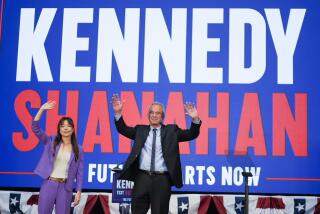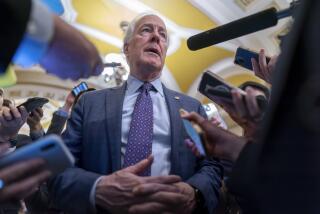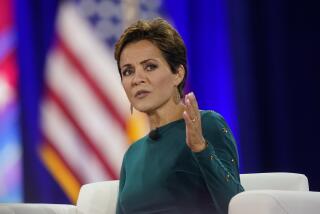Sen. Rand Paul laying groundwork for possible presidential run
CEDAR RAPIDS, Iowa — If he runs for president, says Sen. Rand Paul (R-Ky.), he wants to be considered on his own merits. But when he brought his fledgling campaign to Iowa this weekend, there was no escaping the double-edged legacy of the man he’s almost always compared with — his father.
Until recently, Ron Paul, the former Republican congressman from Texas, still largely overshadowed his son. Then came Sen. Paul’s filibuster in March over the Obama administration’s use of drones. His 13 hours of nearly nonstop talk became a phenomenon of social media and cable television, and suddenly turned the younger Paul into a star in conservative circles.
Now, as the first-term senator seeks to leverage the attention to launch a run for the GOP nomination, a key question is whether he can keep the passionate engagement of his father’s libertarian supporters while reaching beyond them to other Republicans, many of whom the elder Paul alienated during more than two decades in Congress and three presidential bids.
In small-group meetings here, as well as at his main event — the keynote speech to about 500 Republican activists at the state party’s annual Lincoln Day dinner — Paul appeared to make headway.
He offered a message that combined steadfast social conservatism — opposition to abortion, defense of traditional marriage — with an insistence that Republicans “need to reach out to other people who don’t look like us.” That included support for at least the idea of immigration reform, if not the specifics of the bill now before the Senate. He wrapped the message in a tone of optimism about the future more reminiscent of Ronald Reagan than Ron Paul.
“I was impressed,” said Pastor Ron Brammer of RockPower Church in Des Moines, one of a small group of evangelical pastors who met with Paul on Friday afternoon, shortly after he arrived in Cedar Rapids.
“His father — some of his ideas were a little kooky,” Brammer said, citing the elder Paul’s call for abolishing the Federal Reserve. As for the son, “I liked what he had to say.”
At a news conference before the speech, Paul stepped carefully after a reporter asked him to name areas in which he differed from his father, initially joking about not wanting to create dissension at the family’s next Thanksgiving dinner.
“I haven’t come out in favor of legalizing drugs,” he said, adding that he thinks marijuana “isn’t a harmless drug,” although he doesn’t want people “locked up for five years” for possessing it.
He favors “auditing the Fed,” he said, when asked whether he would abolish it.
Those deviations didn’t seem to trouble the many Ron Paul supporters in Friday night’s audience, who greeted the senator with an enthusiastic ovation.
The sold-out crowd, which filled a hotel ballroom here to capacity, testified to Sen. Paul’s drawing power among Iowa conservatives, who provide most of the votes in Iowa’s GOP caucuses, which every four years allocate the first delegates to the party’s nominating convention.
As is typically the case at such gatherings, senior citizens predominated, but several attendees credited Paul with bringing out more younger people than usual. The ages may have varied, but the faces — 100% white — underscored Paul’s warning that the party needs to attract different voters to win in a country that, even in Iowa, has become increasingly diverse.
“I think he threaded the needle pretty well,” Joel Kurtinitis, who supported Ron Paul’s 2012 presidential campaign, said after the speech.
Kurtinitis, a member of the state party central committee and head of a group of libertarians that aims to reach out to the large faction of social conservatives here, said Sen. Paul’s main challenge was to quell worries among some of those voters.
“The biggest concern” is that Paul needs to show that he “doesn’t come across as soft on social issues,” he said. That, and immigration.
“Amnesty is always going to be a tough sell,” Kurtinitis said.
Indeed, before Paul spoke, Iowa Rep. Steve King, a conservative favorite, received loud applause for his total rejection of the proposed immigration bill, which he said would destroy the “rule of law” by offering “amnesty to everyone in America illegally.”
Paul, by contrast, offered a carefully nuanced position, reminding the crowd that their party “needs to attract the Latino vote” and that immigration is “somewhat of a gateway issue” for many Latinos.
On a practical level, he said, doing nothing to change the status quo amounts to a “de facto amnesty” because “the people are here,” and “they’re not going home.” That argument, with its implicit abandonment of the “self-deportation” idea that GOP nominee Mitt Romney advocated in 2012, has gained considerable support among conservatives, illustrating how much the politics of the issue have changed in just a year.
Paul said he would try to toughen the bill’s provisions for border security and give Congress more authority over the pace of legalization. Ultimately, however, “there’s a chance I can vote for the bill,” he said. “I don’t want to just say I’m voting no.”
Paul remained largely silent on foreign affairs, one area in which his father’s positions most clearly departed from Republican orthodoxy.
His only foray into the subject was a spirited attack on former Secretary of State Hillary Rodham Clinton — employing a line he probably will repeat often as he builds a campaign that potentially could have him running against Clinton in 2016.
For months before the attack last September in Benghazi, Libya, in which U.S. Ambassador J. Christopher Stevens and three other Americans were killed, the State Department had brushed aside requests by diplomats in Libya for more security, Paul said.
Clinton’s failure to answer those calls, he charged, was a “dereliction of duty” that “should preclude her from holding higher office.”
More to Read
Start your day right
Sign up for Essential California for news, features and recommendations from the L.A. Times and beyond in your inbox six days a week.
You may occasionally receive promotional content from the Los Angeles Times.







